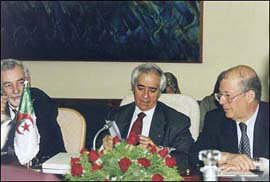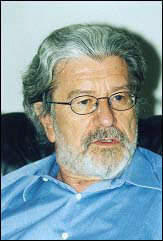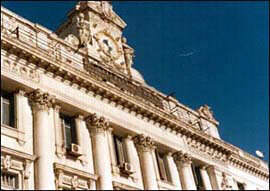 COMMERCE COMMERCE |
 Progressive Integration in the Global Market Progressive Integration in the Global Market |
Algeria is a country that depends heavily on imports, with about 12 billion USD spent for the acquisition of consumer goods, food, industrial equipment, spare parts and industrial inputs. On the other hand, the export sector is made up of mainly petrochemical products totaling about 17.5 billion USD, which represents 97% of total exports, 30% of GDP and 65% of the government budget. Exports, excluding hydrocarbons, represent only 3% i.e. 279 million USD. Agriculture remains marginal, while the industrial sector, excluding the oil industry, remains stagnant at 7% of GDP. France, the United States of America and Italy are Algeria's main trading partners, in imports as well as exports.
To balance its exports and attract investors, Algeria is now committed to a policy of open commercial environment, by adopting a number of measures. Among these measures is a new customs fee to simplify import and export procedures and support investments. Algeria has also subscribed to Article VIII of the IMF Articles, enabling the convertibility of the Algerian Dinar for current transactions. The different trade agreements that Algeria signed with the European Union, the WTO, the UMA (Union du Maghreb Arabe, Arab Maghreb Union), the Arab Free Trading Zone and within the NEPAD, which should attract investment to the African continent, are an undeniable testament of Algeria's commitment to be part of the international trade.
 Becoming Member of the WTO Becoming Member of the WTO |
With regards to international trade, Algeria has deployed considerable efforts to become a member of the World Trade Organization, namely regarding normalization and intellectual property. One of the first requirements was to abandon centralized economy to conform the Algerian economy to the requirements of flexibility, competition and security, necessary for entrepreneurship and free investment. During the past two years, laws and regulations have been passed in order to liberalize a number of the Algerian economy's sectors. In this framework, the laws passed in 1995 and 2001 were the first materialization of the reorganization process of the public sector, taking into account, among other things, a rapid privatization process. Being conscious of its importance for economic growth, the government focused attention on the promotion of the private sector, namely through the adoption of a number of laws pertaining to the promotion of investment and the tariff system.

All these elements must go hand in hand with a macro-economic policy to insure durable stability. With regards to this point, the progress of Algeria is considerable. Five years ago, Algeria's economy was heavily indebted, today however, economic indicators are encouraging namely thanks to a drastic stabilization program and the support of the IMF. External debt has decreased from 32.5 billion USD in 1994 to 22.5 billion USD today. For the past three years, Algeria achieved a balanced budget and was able to reconstruct its foreign currency reserves, totaling 17.9 billion USD at the end of the 2001 fiscal year. These are, of course, the results of restraint policy measures undertaken by the government as well as favorable oil prices these past years. The Algerian authorities took advantage of this slight oil price improvement to set a regulation fund to support economic growth during hard times. Moreover, seven billion USD have been allocated to finance an economic stimulation program in addition to the structural reforms that have been launched. Among other things, this program will help decrease unemployment and improve living conditions for the population. The well-being of the Algerian population must be interpreted as the first factor of durable development. It is therefore by virtue of all these efforts that Algeria is requesting membership to the WTO as a democratic country willing to boost its radical economic rethinking and to be more involved in international trade.
 Association Agreement between the EU and Algeria Association Agreement between the EU and Algeria |
Another decisive step towards the integration of Algeria in the world economy is the recently ratified Association Agreement with the European Community. The commercial part of this agreement illustrates the most striking aspect of Algeria's new foreign policy.The trade relations between the EU and Algeria are good. Almost 65% of Algeria's exports are destined to Europe, while 58% of Algeria's imports come from Europe.

The signature of a partnership agreement serves to strengthen these ties between Europe and Algeria and offers promising prospects. A number of points are emphasized: regular political and economic dialogue, progressive creation of a free trading zone in compliance with the rules and regulations of the WTO, provisions pertaining to freedom of establishment, liberalization of services, free capital flow and the application of EU competition laws, provisions pertaining to justice and internal affairs, reinforcement of economic cooperation, financial cooperation, the establishment of an association council and an association committee with powers of decision.
| This association agreement is in the wake of the MEDA Program, the main element of economic and financial cooperation of the Euro-Mediterranean partnership. It enables the EU to provide financial and technical aid to countries south of the Mediterranean and has three objectives: to reinforce political and democratic stability, to create a free trading zone between the European Union and its Mediterranean partners by 2010 and to develop economic and social cooperation, taking into consideration human and cultural aspects.
"Within the MEDA Program, the financial section of the Euro-Mediterranean cooperation amounts to 5.5 billion Euros. With regards to Algeria, we have presently a stock of about 25 projects whose global value will reach about half a billion Euros in 2004. Presently, about 20 projects are being executed, the largest part concerns the structure reforms sectors: finance, banks, small and medium companies. Furthermore, we are also involved in social and economic development projects to support social initiatives and we even provide assistance to modernize the police force" explains Mr. Lucio Guerrato, European Union Ambassador in Algeria.
In parallel to this association agreement with the European Union, one must note another development tool established by the Maghreb countries, the UMA (Union du Maghreb Arabe, Arab Maghreb Union). The Arab Maghreb Union, which comprises Algeria, Libya, Morocco, Mauritania and Tunisia, is working towards the creation of a free Maghreb trading zone within a few years in preparation of a customs union. "For Algeria, the creation of the Arab Maghreb Union is a strategic objective, which by definition cannot be affected by local economic difficulties and localized divergences which may exist among individual UMA countries. Algeria's approach is dictated by the universal tendency to regroup and to use one's potentials in synergy with others, a fact that the Maghreb can no longer evade at the risk of being marginalized and excluded from the world geo-political configuration" states Mr Benflis, Head of Government.
 Trade and Investment Promotion Trade and Investment Promotion |

Algeria put into place a series of concrete measures to boost trade and promote investment. Mr. Chami, general manager of the National Chamber of Commerce and Industry (CACI) is working towards this objective, trying to offer better insight and a clearer image of the domestic market for national operators as well as foreign investors. "Missions of exploration are organized abroad to identify potential businessmen looking for opportunities for their products. We also guide foreign delegations looking for partners for possible investment opportunities", explains Mr. Chami. He also adds: "The opening of the market may have positive or negative aspects. With regards to the positive aspects, imports have been rationalized to limit waste and reduce import prices. This has been witnessed for basic products such as coffee, sugar, semolina, etc. (…) Today, the number of operators as well as strong competition have decreased prices and improved the quality of products and services." The CACI is therefore a choice representative.
The mission of the Office for the Promotion of Foreign Trade (PROMEX) is to reinforce the ties between nationals and foreigners. Mr. Khelifi, general manager of PROMEX is convinced that it is important to capitalize on Algeria's comparative economic advantages. He states: "Algeria is the most important, the most diversified and the most solvent market of the Maghreb Union with a huge industrial potential." The SAFEX (Société Algérienne des Foires et Exportations, Algerian Fairs and Export Company) is an essential element for the promotion of Algeria abroad. Mr. Gasmi, communications manager of the SAFEX, believes that "today, Algeria needs a new policy geared mainly towards the search for industrial partners to create wealth and work." SAFEX is also involved in the organization of the International Fair of Algiers.
International opening presents, in the long run, undeniable advantages for the development of the Algerian economy, however, a number of entrepreneurs denounce the haste with which it has been undertaken. For instance, the association agreement with the European Union is worrying in that the whole agreement revolves mainly around the tariff dismantlement. This decision in particular will have negative results for national companies in the short term, as they will lose markets that have been protected until now. Faced with this real threat, Mr Abdelhamid Temmar, former Trade Minister in charge of privatization is reassuring and states that a protection program has been put in place offering the possibility to be protected through a 48% tax fee. This tax fee will be dismantled by 12% per year, which insures protection for a number of years. In the coming years, Algeria must modernize to become more competitive with regards to foreign competition. Nevertheless, for a country that was governed by an autarkic regime, which privileged inward policy, reflexes of free competition are slow to be implemented. |

